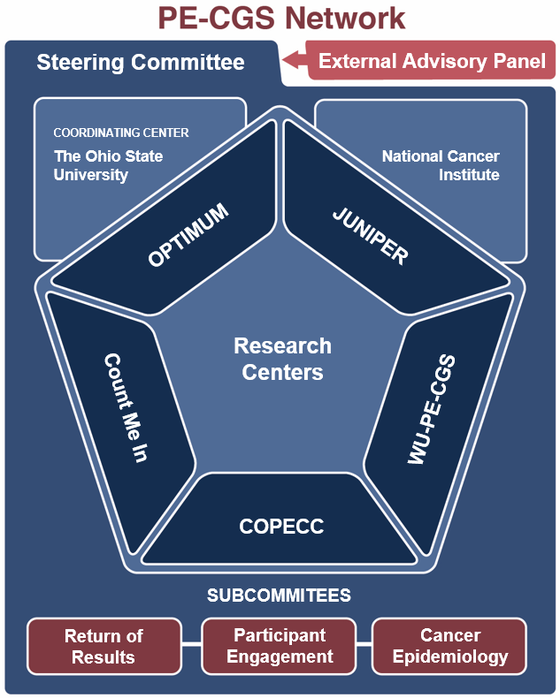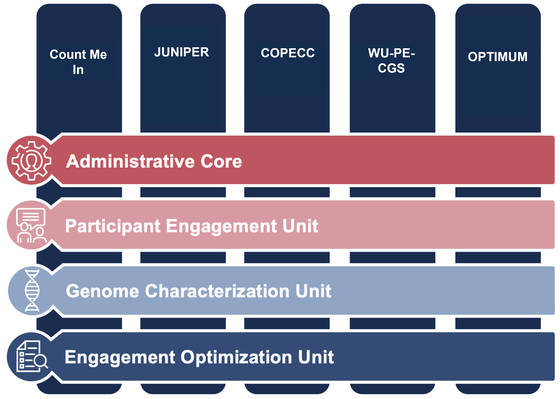Network Structure
Overarching Governance
The Network is governed by a Steering Committee composed of representatives from each of five Research Centers, the Coordinating Center, and NCI. An External Advisory Panel provides input on scientific direction, evaluates the progress of the network, and offers recommendations for improvement.
Subcommittees convene under the supervision of the Steering Committee to address topics that have pertinence to and impact across the Network. Three subcommittees were initially developed including a Participant Engagement subcommittee, Return of Results Subcommittee, and Cancer Epidemiology Subcommittee.
- The Participant Engagement Subcommittee will generate tools and resources that can be used to facilitate patient engagement in research activities, as well as engagement optimization across the Network.
- The Return of Results Subcommittee will optimize the return of genomic information to inform both patient-level decision making and attend to issues of ethics and regulatory compliance.
- The Cancer Epidemiology Subcommittee will discuss and conduct research on the impact of genetic/molecular markers and social determinants of health on cancer disparities.

External Advisory Panel (EAP)
The External Advisory Panel (EAP) for the Participant Engagement-Cancer Genome Sequencing (PE-CGS) Network supports the Network’s long-term goals and sustainability. It evaluates the Network’s progress and advises its Steering Committee on current and future network activities. The EAP is composed of oncologists, cancer advocates, communication experts, established scientific leaders, individuals with a history of cancer diagnosis, and other stakeholders with relevant expertise.
EAP Members
Angela R. Bradbury, MD
Associate Professor of Medicine, Perelman Center for Advanced Medicine
University of Pennsylvania
Melissa B. Davis, PhD
Director of the Institute of Translational Genomic Medicine
Professor of Microbiology, Biochemistry, and Immunology
Morehouse School of Medicine
Janet Freeman-Daily, MS, Eng
Metastatic lung cancer patient and research advocate, Co-founder and Board Chair
The ROS1ders
D. Williams ("Will") Parsons, MD, PhD
Deputy Director, Texas Children's Cancer and Hematology Centers Department of Pediatrics
Baylor College of Medicine
Barbara Segarra-Vazquez, MT, DHSc
Professor, School of Health Professions
Director, Clinical Laboratory Sciences Program
University of Puerto Rico
John S. Witte, PhD
Professor, Departments of Epidemiology & Population Health Biomedical Data Sciences
Stanford University
Research Center Units
Each research center contains three functional components: Engagement Optimization Unit, Participant Engagement Unit, and Genome Characterization Unit. These units are designed to promote multi-center, trans-disciplinary research that is responsive to the needs of participants and their communities.
- Engagement Optimization Units are charged with incorporating the ethical values of autonomy, privacy, ownership, and relevance to adopt, test and implement optimized recruitment, enrollment, and retention protocols for various studies.
- Participant Engagement Units are responsible for establishing direct participant engagement with the purpose of performing genomic characterization.
- Genome Characterization Units are responsible for completing genomic characterizations of germline and tumor (i.e., DNA and RNA sequencing, bioinformatic analyses and interpretations, etc.).

